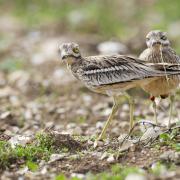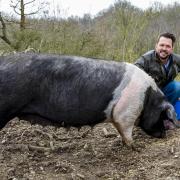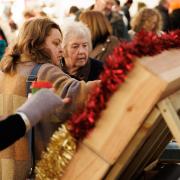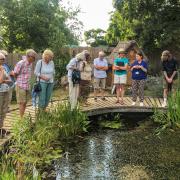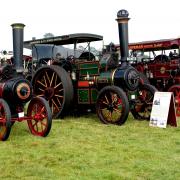If you love animals, a stroll with an alpaca in the Suffolk countryside is a lovely, relaxed
way to spend an afternoon. We gave it a try at Hilly Ridge Alapacas at Wattisham, home to 60 of these lovable woolly wanderers.
Ping. The WhatsApp message arrived. 'Shall we book?' and a photo of... alpacas? My sister, Gail, had spotted them in a paddock while walking her dog around the lanes and footpaths between Bildeston and Wattisham.
Hilly Ridge Alpacas, breeders offering the chance to meet and walk with their lovely animals. So we did, one sunny Saturday afternoon in May, as my birthday gift to Gail, and had the best time in ages.
Hilly Ridge alpacas is run by Jo Bridge, and her partner Scott, who moved to their old Suffolk farm in 2010 and in 2012 bought three pregnant female alpacas to keep the grass down. Their herd soon expanded, Jo went on courses to learn more about alpacas and their potential as a business venture.

She retired from the police force and now spends all her time looking after the alpacas, organising treks and other events, such as keeper experiences and visits to care homes, schools and hospices. Alpacas are calm and intelligent, and very trainable, so they are excellent company for people with learning difficulties and special needs.
We booked a package of one alpaca for two people to share, which made sense when it came to taking photos, plus a pot of food to feed the alpacas in the paddock (Jo puts the £1 she charges for this in a charity pot).
Our walking companions (apart from some other humans) were Icarus, Hurricane and Monty, plus youngsters Out of the Blue and Landslide (Jo has an `80s rock theme going when it comes to names). The young alpacas need to learn how to walk with humans, so anyone who books a Keeper Experience gets to help train them. Out of the Blue and Landslide behaved impeccably.

We chose Monty for our walking companion. A stud male, Monty is co-owned by breeders on the Isle of Wight, so spends a few months there every year sunning himself in the company of lady alpacas. Monty is a fine specimen and, according to Jo, is well aware of the fact. He loves attention and adopts a pose the second he spots a camera. Perfect.
Jo ran through a few rules of the walk, the most important being don't let go of the rope. The alpacas walk sedately at a gentle pace something like a veteran Labrador, but should the mood take them they're capable of taking off, reaching a speed of 36mph.
The walk follows a route along grassy field edges and footpaths, crossing a small stream, then over a little bridge, with stops along the way for photos and grazing (alpacas only). Monty was fabulous. From his slightly haughty demeanour, I got the feeling he was permitting us to walk with him and would be the judge of whether we were suitable.

He declined to munch on some lush spring grass with the other alpacas, but happily accepted a handful from Gail. But he melted when we stopped for a selfie and even indulged in a roll in the grass. Alpacas love to do this.
We learnt other interesting alpaca facts along the way from Jo's entertaining talk and quiz. They come from Peru, Bolivia and Chile. They live about 10 years in their native countries but up to 25 years here in the UK where they have no predators and doting humans to look after them.
Females typically have one baby, incubated for 10-11 months. They give birth in daylight hours, and they can pause their pregnancy should circumstances not be right, such as shortage of food or illness.

Their wool is incredibly fine and warm and there are two types of alpaca; Huacaya, with dense, wavy wool, and less common Suri, with less dense but quite silky wool. They're shorn once a year, a job that Jo learnt to do, but which she has handed over to a visiting New Zealand shearer in the interests of preserving her back.
Jo really knows her alpacas. With 60 animals she's become an experienced breeder and is a British Alpaca Society-approved judge, travelling far and wide to competitions.
At the end of the walk the alpacas went back into their holding pen while Jo took us to see the big barns, purpose-built to house the females and males separately when they're not out in the paddock. It's also where pregnant alpacas and the pygmy goats that also live at Hilly Ridge can give birth.

Out in the paddock we got to meet the rest of the herd, and the pygmy goats, before heading back to the obstacle course where the alpacas (and their handlers) compete for a rosette. Much like dog agility, it involves weaving in and out of poles, placing feet in hoops, standing on a low platform, and stepping over some low 'jumps' against the clock.
Alpacas really do this? Yes, they do... well, Monty doesn't. It's way beneath him. So Gail and I borrowed Hurricane and finished an respectable second. No rosette, but a fabulous afternoon.
Find them
Hilly Ridge Alpacas, Clay Hill Farm, Clay Hill Lane, Wattisham IP7 7JS
hillyridgealpacas.co.uk






